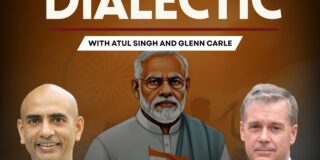Whether you like Donald Trump or not, you’ve got to give him credit for one important thing. He’s reinvigorating national debate about the Constitution and the limits on the powers it gives to the president.
With his attacks on judges and journalists, his efforts to shut the borders to Muslims, his attempts to quell inquiries into his campaign’s Russia ties, his early-morning tweetstorms and so much more, Trump has breached every norm of presidential conduct. And he’s testing the constitutional separation of powers in ways the nation’s founders could never have anticipated.
In this episode of Soonish, we try to understand Trump’s impact on government — and what the Trump presidency might mean for America’s future — using a metaphor from the aerospace business: gimbal lock.
Pilots and astronauts know gimbal lock as a scary situation in which a craft’s inertial guidance system can fail to isolate the central gyroscope from the craft’s movements. Normally, a spinning gyroscope always points in the same direction, which provides a consistent reference point for navigation. But that only works as long as the craft can pitch, roll and yaw around the gyroscope freely. Gimbals — concentric, nested rings mounted around the gyroscope at 90-degree angles to one another — are designed to allow exactly that. But in older guidance systems, including those on the Apollo spacecraft, pointing the craft in certain forbidden directions can cause two or more of the gimbals to align. That means the gimbals can keep the gyroscope isolated from maneuvers in two directions, but not from maneuvers in the third direction — rendering the whole system useless.
Attentive fans of the movie Apollo 13 may remember that as the astronauts attempted to keep control of their damaged capsule, they worried loudly about gimbal lock. That wasn’t just a dramatic device. For the Apollo astronauts, it was a constant concern.
What I’m suggesting in this episode is that we consider the US government as if it were a system of gimbals built to protect what journalist and biographer Walter Isaacson has called our constitutional gyroscope. (Isaacson’s metaphor, which first turned up in his biography of Albert Einstein, was what got me thinking along these lines in the first place.) A three-gimbal system corresponds nicely to the three branches of government: the executive, legislative and judicial.
The Constitution sets up an elaborate system of checks and balances to ensure that the branches always operate independently and that no single branch obtains too much power. For example, the president can veto bills sent to him or her by Congress, but Congress has the power to override the veto and even impeach the president. The president appoints Supreme Court justices, but the Senate has to confirm them. The judiciary can convict people, but the president can pardon them. And so on.
We may even have a stabilizing “fourth gimbal” in the form of the Fourth Estate — the media outlets that, historically, have kept tabs on the government and reported on its excesses. The big question we face today is whether the system of gimbals is foolproof — or whether, in fact, it may be vulnerable to the malice and/or ineptitude of a player like Trump, who seems to have little knowledge of or respect for the Constitution itself.
And it’s not just Trump who’s testing the system.
1) Both houses of Congress are controlled by the president’s political party — and that party’s leaders, seemingly intent on their mission to pass health care and tax legislation, have allowed the president to roam largely unchallenged.
2) With the addition of Neil Gorsuch to the Supreme Court, the court’s liberal-to-moderate wing is again just one swing vote away from losing its majority on issues such as abortion rights.
3) The independent press has been partially undermined by political polarization, the industry’s own economic distress, and the surprising effectiveness of the Trump administration’s “alternative facts” campaign.
Under conditions like this, there may be a danger that two or more branches of government will end up acting in lockstep. That could put our system into a kind of gimbal lock, disabling the checks and balances that would normally protect the Constitution and moderate the actions of an authoritarian president.
Constitutional gimbal lock might not send us careening into space, but it wouldn’t be pretty.
That’s the proposition this episode explores, anyway. Making the show has been a fun and interesting way for me to cope with a set of political circumstances that I could never have imagined back in mid-2016, when I first hatched the plans to launch a podcast about the future. Thankfully, I found a couple of very generous and cooperative government and public policy experts, Yascha Mounk and David Eaves, to help me think through the idea.
Is the gimbal-lock metaphor useful or just fun? Well, listen and decide for yourself.
*[This podcast was originally featured by Soonish.]
The views expressed in this article are the author’s own and do not necessarily reflect Fair Observer’s editorial policy.
Photo Credit: Joseph Sohm / Shutterstock.com














Commenting Guidelines
Please read our commenting guidelines before commenting.
1. Be Respectful: Please be polite to the author. Avoid hostility. The whole point of Fair Observer is openness to different perspectives from perspectives from around the world.
2. Comment Thoughtfully: Please be relevant and constructive. We do not allow personal attacks, disinformation or trolling. We will remove hate speech or incitement.
3. Contribute Usefully: Add something of value — a point of view, an argument, a personal experience or a relevant link if you are citing statistics and key facts.
Please agree to the guidelines before proceeding.